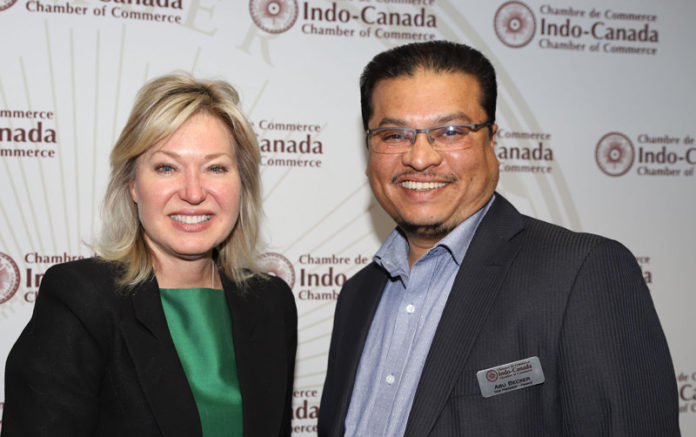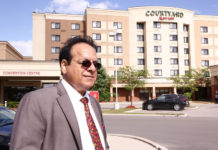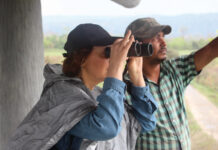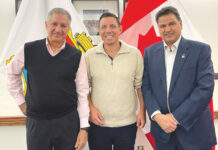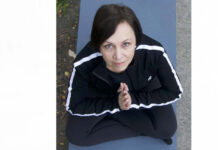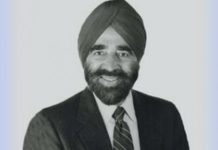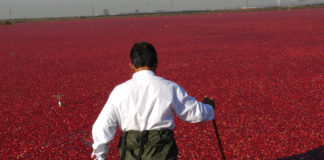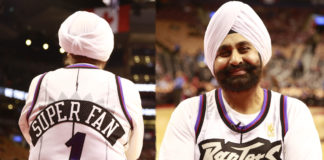His great grandfather was the richest person in Trichy. A very close friend of Mahtama Gandhi, he pioneered sherbat business in South India
The Canadian Bazaar
BRAMPTON: Well-known Indo-Canadian businessman Abu Becker of the Nrich Group of Companies in Toronto represents the very best in human nature.
A soft-spoken and humble man, he is secular to the core, showing great respect for all religions and creeds.
He was born into a Trichy (Tamil Nadu) family that pioneered many businesses in pre-Independence India, started cinema halls and contributed hugely to the country’s freedom struggle.
His great grandfather A Mohamed Hussain was a known Gandhian freedom fighter as well as a pioneer the sherbet (syrup) business in south India.
“My great grandfather was very close to Gandhiji and he donated land to build the Central Gandhi Market Arch in Trichy in 1928. A monument to him stands in that market to this day,” says Becker.
Various businesses made his great grandfather the richest person in Trichy.
“When my grandfather passed away after a heart attack, the death tax on his estate was to the tune of two lakh rupees in those days,’’ says Abu Becker.
Becker’s grandfather and his brothers too started many businesses – scrap metal imports into India, rice mills, Central Talkies cinema hall in Trichy and production of big-banner films.
Indeed, Becker’s family wealth would have allowed him to live a lavish life. “But I wanted to be my own man and create my own wealth,’’ he says, sitting in his beautiful office on Rexdale Boulevard in Toronto.



He says his childhood dream was to become a doctor.
Having failed to realise his dream, Becker started his career in hospitality in 1991. He worked in India for some time, then moved to Doha to work with a big travel agency, and immigrated to Canada in 1998.
His Canadian success story began with the setting up of his own travel agency – AirBond Travel – in August 2000.
From travel business, he went on to setting up the Nrich Group spanning businesses in IT, clean energy, waste management, online delivery, etc.
Today, all his businesses are well established. “But it’s just the beginning as we have big dreams,’’ he says.
Amid all this, Becker has never forgotten to keep alive his family tradition of giving, donating liberally to charitable causes.
When floods ravaged my native Tamil Nadu in 2015, he raised $45,000 and flew to Chennai to personally help the victims. He has also helped raise over a million dollar for the William Osler Foundation.
A man of faith, he respects all religions as equal. A few years ago when a Canadian delegation went to attend Pravasi Bharatiya Divas in Chennai, he took 34 people at his own cost to the famous Tirupati temple for prayers.
In this interview, Abu Becker goes back in time to tell his family story, his life journey and how his family legacy guides him in his daily life and what his future plans are:


Q: Let us first talk about your family.
My ancestors originally came from Dharapuram – one of the oldest towns in Tamil Nadu. They were rowuthar or horse caretakers for nawabs and kings. Later, they started farming and businesses.
My great grandfather A Mohamed Hussain became a sherbet merchant. He was the first to introduce the concept of bottling in business.
A great freedom fighter, he was close to Gandhiji. When the Mahatma came to Trichy, my grandfather welcomed him. He also donated land to build the Central Gandhi Market Arch in Trichy in 1928.
The city wanted to name the arch after him, but he insisted that it should be named after Gandhiji. A plaque still stands there to commemorate his contribution.
His five sons, including my grandfather, built on his legacy and established great businesses.
Q: What great businesses did your grandfather and his brothers build?
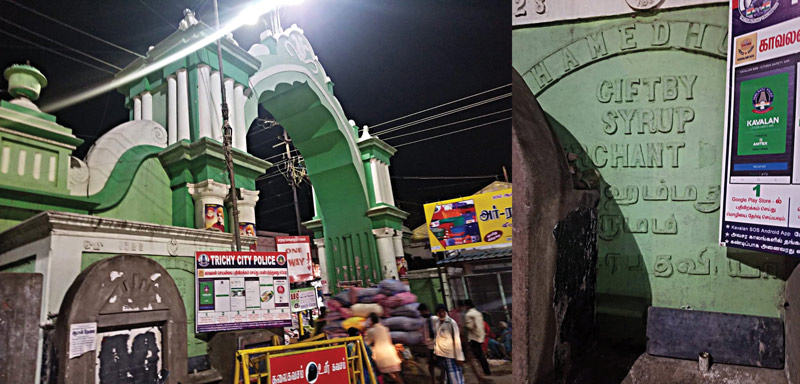

My grandfather’s eldest brother Shahul Hamid made big achievements. He built Trichy’s first rice mill in the 1940s. He donated rice generously during the Second World War to feed fellow Indians.
Hamid also built Tower Hotel and the city’s first cinema hall – Central Talkies – on Edna Street. All equipment and furniture for the cinema hall came from England.
Central Talkies was a 22,000-square foot complex. The first film screened there was Payithiyakaran, starring N S Krishnan. It was the Tamil actor’s first film after his acquittal in the famous Lakshmikanthan murder case.
Hamid was very close to top Tamil stars and co-produced many Hindu-themed films.
Shahul Hamid Nagar in Trichy was named after him by the city municipality.
Lord Mountbatten honoured him with the title of Khan Bahadur in 1945.


Q: You said your grandfather became the richest person in Trichy at that time.
Yes, my grandfather Mohamed Abbas was the richest person in Trichy. In the 1930s, he became an iron scrap merchant and imported scrap metal from Malaysia, Indonesia, Burma and Laos because India needed it badly at that time. He set up 15 shops all over south India as part of this business.
My father – Mohamed Nohu – was born after 15 years of marriage. Family wealth allowed my dad to be taught at home. My grandmother ran a big household where she would cook for hundreds of people employed in our businesses.
Because of his business engagements, my grandfather spent lots of time out of India. His money financed the family’s other businesses.
He gave money to his brothers to buy land in the centre of Trichy to build a gas station and also establish Central Talkies. My grandfather also owned an oil mill in Dindigul and other properties in Kodambakkam in Chennai.
He was very pious and built the Begum Masjid and fed poor people.
Alas, he passed away very early in his life.
Q: What happened?
My grandfather died at 43 of a heart attack. When he died, our family paid a death tax of two lakh rupees on his estate in those days.
When I was a kid, our family servants used to tell me that I looked like my grandfather. My grandfather was very strict with my dad.
Q: What happened to your dad after your grandfather passed away?
My dad – along with his younger brother and two sisters – was brought up by his uncles.
Since my grandfather’s money had financed businesses of his brothers, my father was also supposed to get his share from his uncles, but it didn’t happen.
Q: Tell us about your early life. Where were you born?




My dad married my mother Tajunisa belonging to a farming and business family from Sathyamanglam village (of Veerappan fame). My maternal uncle Hamid was the project manager of the famous 1976 movie Annkili – which was also the first film of the legendary composer Ilaiyaraaja.
I was born in Trichy and grew up surrounded by family servants. I did my schooling from St Joseph’s School which was also President APJ Abdul Kalam’s alma mater. Kalamji used to come to lecture at our school.
I won the gold medal in mathematics in my 10th standard by getting 100 marks out of 100.
After my higher secondary, I graduated in computer science from Ooty. Then I went to Delhi to do my hotel management course.
Q: You said you wanted to become a doctor.
Yes. But I fell slightly short of the required marks in the non-reserved category. My marks were 92.5 percent and the last candidate to get selected had 92.87 per cent marks.
Then I applied for a medical college in Tashkent and was selected. But my father didn’t allow me to go to Tashkent. We had heated arguments and I didn’t speak to him for one year.
But my father turned out to be right because the Soviet Union collapsed one year later and all the students came back.
Q: What was your first job in life?
After doing my hotel management course, I worked as a front desk manager in a hotel in Ooty for over a year. There I met a sheikh (Mohammed Hussain al-Mulla) who ran a travel agency in Doha. That meeting turned out to be the turning point in my life.
Q: How?
Sheikh Al-Mulla was visiting India to see various places. I took him around Ooty. He liked me. He said he ran a travel agency in Doha and asked me if I would like to come to join him. I gave him my resume.
Two months later, he sent me my visa and air ticket and I flew to Doha from Bombay. It was 1992.
Then came a second turning point in my life.
Q: What was the second turning point?
At Al-Mulla Travels, I looked after their hotel management – booking hotel rooms, etc. Pleased with my work, my boss sent me to do a travel industry course run by Kuwait Airways and Gulf Air (the mother of all Gulf airlines). That course changed my life as I came into the travel industry.
When I finished my course, the Sheikh put me in charge of ticketing and hotel reservations. The Gulf was booming at that time. Dubai was beginning to become the global hub. I did lots of business for my boss.
I used to handle everything for Qatari royal families going to the US, Europe, etc.
The current CEO of Kuwait Airways used to come to our office and I became friends with him. Quickly, I became the top agent and got awarded with gold coins.
I acquired so much experience and knowledge about the travel industry that this profession became my passion. I also found my wife there.
Q: Was she working at Al-Mulla Travels in Doha?
No (laughs). My father-in-law worked in Doha and he was one of our customers. He spoke to me about marriage and then one thing led to another.
Frankly speaking, I had gone to Doha to make enough money so that I could come back to India, build a big house and marry. Our marriage took place when I went back to India in 1995 during Ramadan time. Since my father was not keeping well, he wanted me to marry as soon as possible.
My father-in-law contacted our family and within a week my wife Humaira and I were married in Salem. She came from a family of judges, governors and landlords. She held a masters degree in nutrition and had studied French in Pondicherry.
After our marriage, we returned to Doha where she became a French teacher.
Q: Why did you leave Qatar and come to Canada?
I made millions for my boss Al-Mulla and he gave us a big villa to live. But one day when I took my pregnant wife to hospital for a check-up, Al-Mulla got angry and wanted me to return to work.
That’s the trigger for me to leave him and Qatar.
Q: What did you do next?
I had already applied for immigration to Australia and New Zealand earlier and was almost selected.
But after my tiff with my boss, I applied for Canada as my two best friends – Solomon and Radhakrishna – in Doha got immigration to Canada. In fact, Radha filled my application for Canada and sent it to their London office.
My dream was that I would get an IT job and thought that my wife would become a qualified dietician. We landed in Toronto on June 8, 1998.
Q: How did you start your life in Canada?
My friend Solomon picked us up from the airport and put us up with a Sri Lankan friend in Scarborough. Within days, we rented a room from Solomon’s landlord. That landlord put me in touch with a travel agency owner he knew. The travel agency offered me voluntary work. In two years, I turned around that travel agency.
In August 2000, I started my own AirBond Travel agency in Etobicoke.
Q: Why the name AirBond?
I liked the word bond – I wanted to give a promise to my customers and keep it. I also like James Bond. This word is very easy to remember. That’s why I named our company AirBond Travel.
Q: How tough was the beginning?
Very frustrating. Despite upgrading her qualifications, my wife couldn’t find a job. Instead, she was asked to work under a dietician. She was upset and joined me. Our boy was very young and our one-room office became his kindergarten.
Then 9/11 happened and everybody was speaking negatively about the travel business. But I had faith in myself. AirBond Travel managed to weather those uncertain times.
Q: When did the big break come?
In 2003 when we got IT giants as my clients. In my presentation to them I told them how with my world-class experience and no overheads, I would give them the best bang for their buck.
AirBond Travel took off in a big way.
Q: When did you set up the Nrich Group of Companies?
We set up the Nrich Group (N stands for naturally) in 2003. All our other businesses are now under this group.
Our first venture was to sell milk, etc. through drive-through facilities and online, but it got stalled as my friend and partner Vijay Anand moved to California.
Q: What businesses do you run now under the Nrich Group of Companies?
IT is my big passion for business.
As my travel business started growing bigger by 2004, we set up my own call centre business in Chennai under the name of Nrich Infotech.
We have set up Nrich Cleantech Inc. for waste management. Registered in Canada and India, it uses the concept of BOFT. A US company is our tech and finance partner in it. We have been shortlisted for a project in Kochi. While I am the CEO of this company, my friend Radhakrishnan is the COO.
Nrich Technologies Inc., another company of our group, became an OEM partner with Kochi-based SFO Technology Limited in 2015 for their business in Canada.
Nrich Cloud has partnered with the city of Timmins to set up a data centre for them.
In 2019, we set up JuiceCo to install fresh juice machines. My son is its director and I am helping him in it.




Q: You were a director with the Indo-Canada Chamber of Commerce (ICCC).
Yes, I got associated with the ICCC after attending the 2009 Pravasi Bharatiya Divas in Chennai, addressed by the then Prime Minister Manmohan Singh, Karunanidhi and the then Gujarat CM Narendra Modi.
I met ICCC members there. I joined the ICCC as I wanted to explore other businesses.
Over the years, I have attended PBD as part of ICCC delegations to India. This association has helped me know mayors, politicians and top business leaders in India and form partnerships.
I am a life member of the ICCC.
Q: Who are your role models?
The Prophet, Mahatma Gandhi and Warren Buffett.
Q: Your biggest inspiration?
My mother. I have always wanted to give her the very best in life.
Q: Anything you dislike about yourself?
Being workaholic.
Q: Do you miss anything in life?
I wish I had a good sister.
Q: Your favourite book?
Napoleon Hill’s Think and Grow Rich.
Q: What is the most precious thing in your life?
India (janmabhoomi) and Canada (karmabhoomi).
Q: Your favourite film star?
Rajinikanth. I wanted to be like him.
Q: Three principles of your life?
1: Be always positive. Vivekananda said:
When you succeed, you lead people.
When you fail, you teach people.
2: Keep the purpose of your life always in your mind.
3: Leave a great legacy. Create something on this beautiful planet before you die.
READ NEXT: Brampton’s Sukhdeep Kang is pioneer woman in South Asian community of Canada

